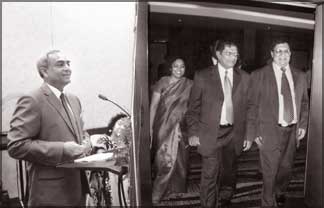Structural drawback prevails
Sarath MALALASEKERA
The rising incidence of crime, is a concomitant of some structural
drawbacks which prevail in our criminal justice system. It is often said
that if there are stronger criminal laws, then crime prevention becomes
easier to achieve, said Attorney General President’s Counsel Mohan
Peiris, at the High Court Judges Colloquium held at the Galadari Hotel
recently.
The meeting was presided over by Chief Justice Asoka de Silva, Legal
Aid Commission Chairman (LAC) S. S. Wijeratne, High Court Judges
association secretary Kumudini Wickramasinghe senior and junior members
of the Official and Unofficial Bar also participated.
|

Attorney General President’s Counsel Mohan Peiris addressing
the High Court Judges Colloquium. At Right- Chief Guest
Chief Justice Asoka de Silva with LAC Chairman S.S.
Wijeratne and High Court Judges Association Secretary
Kumudini Wickramasinghe arriving at the venue. Picture by W.
Chandradasa |
The Attorney General said it is no exaggeration to state that in Sri
Lanka Criminal Law is weighted more in favour of the accused than the
prosecution. When a prosecutor strides into a criminal court with the
sole view to proving his case, the dice is heavily loaded against him.
Against this backdrop “I propose to share with you the anxieties that
torment us and some of the suggestions which might remedy the situation.
Speaking on Burden of proof - the Attorney General emphasised that
what is in effect burden of proof? Though this term is used in different
senses, in one sense it connotes the obligation of a party to establish
his case depending on whether it is civil or criminal. As far as we are
concerned, the term “burden of proof” means the overall burden of the
legal burden that is incumbent upon the prosecution.
The famous case of WOOLMINGTON established what is known today as the
golden thread principle.
It states that the prosecution must establish the guilt of the
accused beyond reasonable doubt. Having defined the term “Proof” in
Section 3, the evidence ordinance gives guidelines in Chapter 9 as to
how the several burdens have to be discharged. The same Chapter deals
with presumptions that a court may draw based on primary facts
established by the prosecution.
It is my contention that our traditional view that the burden lies on
an accused to prove a fact which is especially within his knowledge
should be extended to cover Section 27 discoveries as well.
There must be a positive declaration by the legislature that the
burden lies on the accused in this situation to explain as to how he
acquired this knowledge.
In fact Section 106 of the evidence ordinance states that whenever a
fact is peculiarly within the knowledge of the accused, the burden of
proof in respect of it is on the accused. This is a reproduction of a
rule stated in the old English case of Turner (1816) 5 M and S 206.
The Attorney General emphasised that England has since moved away
from Turner but we still say that the accused must prove a fact only
when it is within his peculiar knowledge. Look at the illustrations to
this section -”A is charged with travelling on a railway without a
ticket. The burden of proving that he had a ticket is on him.”
The cases on this section state that the prosecution must lead some
prima facie evidence before the accused sets out to prove that he had a
ticket -iI was said so in the case of Sanitary Inspector vs Thangamani
Nadar 55 NLR.
In England the cases do not insist on prima facie evidence being led.
In Oliver (1944) KB 68 it was stated that the prosecution need not lead
even prima facie evidence.
The modern trend in England is not to restrict the burden of the
accused only to cases where he had peculiar knowledge. He has to prove a
fact even when the prosecution could have knowledge of that fact. The
defence cannot resile his burden merely by showing that the prosecution
has also peculiar knowledge of the same fact, the Attorney General said.
The Attorney General dealing with Dock Statements said that dock
statements are anomalous features that hamper our prosecutions. I
propose that they be repealed and abrogated from our law. In England
there was a time when the accused where prohibited from giving evidence
because they were so indigent that they did not have the wherewithal to
retain counsel. When they gave evidence unassisted by counsel, they
virtually damage their cases and as a result English Law prohibited them
from giving evidence. Instead English Law conferred on them the right to
make a dock statement. This is the genesis of dock statements in
England. |



